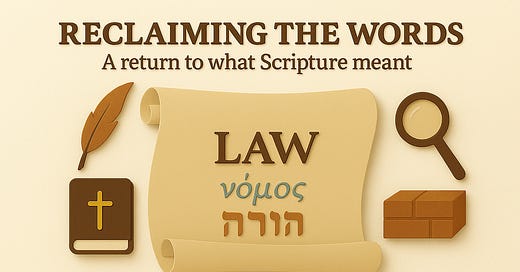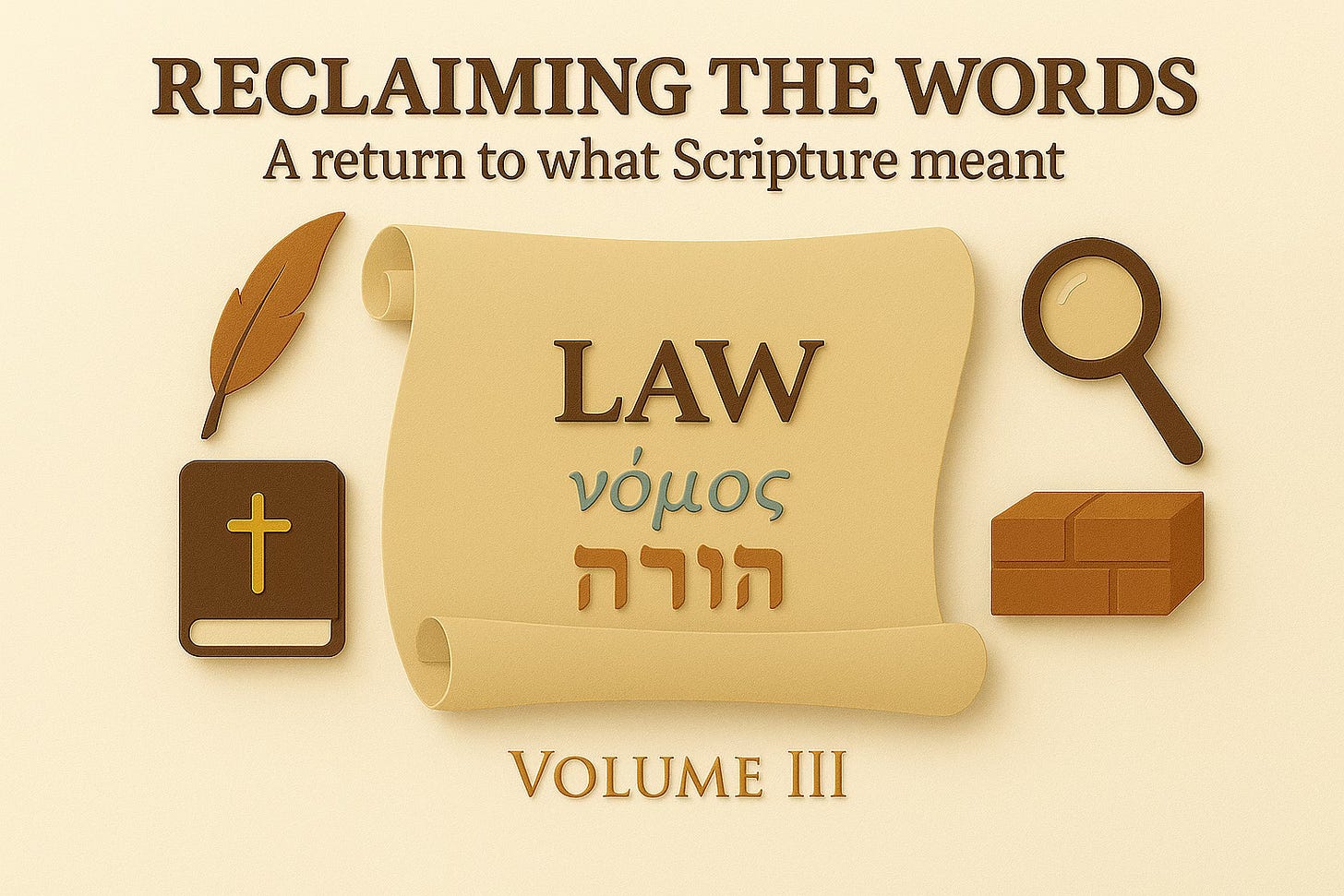Reclaiming the Words, Vol III: The Law
What if the Law wasn’t a burden—but a blueprint for covenant life with Yah?
Reclaiming the Words, Vol III: Law
What if “the Law” isn’t a burden to escape — but the covenantal instructions of a loving Father?
About the Series: Reclaiming the Words
Language forms faith — and over time, sacred words lose their shape.
Reclaiming the Words is a weekly series dedicated to recovering the original meaning of key biblical terms. By exploring the Hebrew and Greek roots of words like believe, grace, church, gospel, and now law, we rediscover their covenant context, cultural grounding, and Kingdom purpose.
Each word reclaimed becomes a doorway to deeper discipleship, rooted in the life and teachings of Yeshua.
Part 3: What Does the “Law” Really Mean?
Reclaiming Torah as Covenant Instruction
“Didn’t Jesus set us free from the Law?”
That’s what many of us were taught — that the Law was harsh, restrictive, or “Old Testament.” That it was the problem grace came to fix.
But what if that’s a misunderstanding of both the Law and the Gospel?
What if “the Law” in your Bible was never meant to imply judgment, but instruction — not a courtroom, but a classroom?
The Hebrew Word: Torah (תּוֹרָה)
The word usually translated Law is actually Torah, from the root yarah — meaning “to point the way.”
It’s better translated as:
Instruction
Teaching
Divine guidance
Torah was Yahweh’s gift to Israel after deliverance — not as a system of merit, but a blueprint for covenant living.
“Oh how I love Your Torah! It is my meditation all the day.”
— Psalm 119:97
The Greek Word: Nomos (νόμος)
In the New Testament, nomos often refers to Torah but can also mean:
Rabbinic tradition (Mark 7:9)
Legalistic misuse of the law (Galatians 3)
God’s eternal instruction (Romans 7:22)
Yeshua and Paul were Hebraic thinkers, not Roman lawyers. To them, Torah was love, not legalism — covenant, not contract.
Yeshua Didn’t Abolish the Law — He Fulfilled It
“Do not think that I came to abolish the Torah or the Prophets… I came to fulfill them.”
— Matthew 5:17
The Greek word plēroō (πληρόω) means to fill up, complete, or bring to fullness — not cancel.
In Matthew 5, Yeshua clarifies:
Not just murder — but anger
Not just adultery — but lust
Not just actions — but the heart behind them
Yeshua lived out Torah perfectly. He is the Living Torah — the Word made flesh (John 1:14).
But What About Paul?
Paul is often misread as anti-Torah. In truth, he wrote:
“So the law is holy, and the commandment is holy and righteous and good.”
— Romans 7:12“Do we then nullify the Law through faith? May it never be! On the contrary, we uphold the Law.”
— Romans 3:31
Paul opposed legalism — treating Torah as a means to earn righteousness. But he upheld Torah as the pattern of covenant life empowered by grace.
The Pattern of Redemption: Grace First, Then Torah
Yahweh didn’t give the Torah as a precondition for salvation. He rescued Israel from Egypt by grace (Exodus 12–14) and then gave them instruction at Sinai (Exodus 19–20).
Rescue → Relationship → Instruction
Just like the Gospel.
“But the one who looks into the perfect law, the law of liberty… will be blessed in their doing.”
— James 1:25
Common Misrepresentations of the Law
Antinomianism — the idea that grace makes obedience irrelevant
🔗 GotQuestions: What is Antinomianism?Supersessionism — the belief that the Church replaced Israel
🔗 One for Israel: Has the Church Replaced Israel?Modern Marcionism — dividing the “harsh” OT God from the “loving” Messiah
🔗 BibleProject: The Bible Is One Unified Story
A Word Worth Reclaiming
“This is the way — walk in it.”
— Isaiah 30:21
Torah is not about control — it’s about communion.
It’s not, “What do I have to do?”
It’s, “How can I walk with the One who saved me?”
Three Practical Applications
Read Torah as Instruction, Not Restriction
Replace “Is this legalistic?” with “What does this reveal about Yahweh’s heart?”Follow Yeshua’s Torah Rhythm
Study His life — Sabbath, generosity, justice, mercy — and walk in His ways.Speak Differently About the Law
Use joyful, reverent language. Start with Psalm 119 or Deuteronomy 30. Invite curiosity, not fear.
Five Discussion Questions
What have you believed about the Law—and how has that changed?
How does rethinking Torah as instruction impact how you read Scripture?
In what ways did Yeshua fulfill (not abolish) the Law?
How would Paul’s letters sound if we assumed Torah was good, not obsolete?
What would shift in the modern church if Torah was embraced as covenant wisdom?




